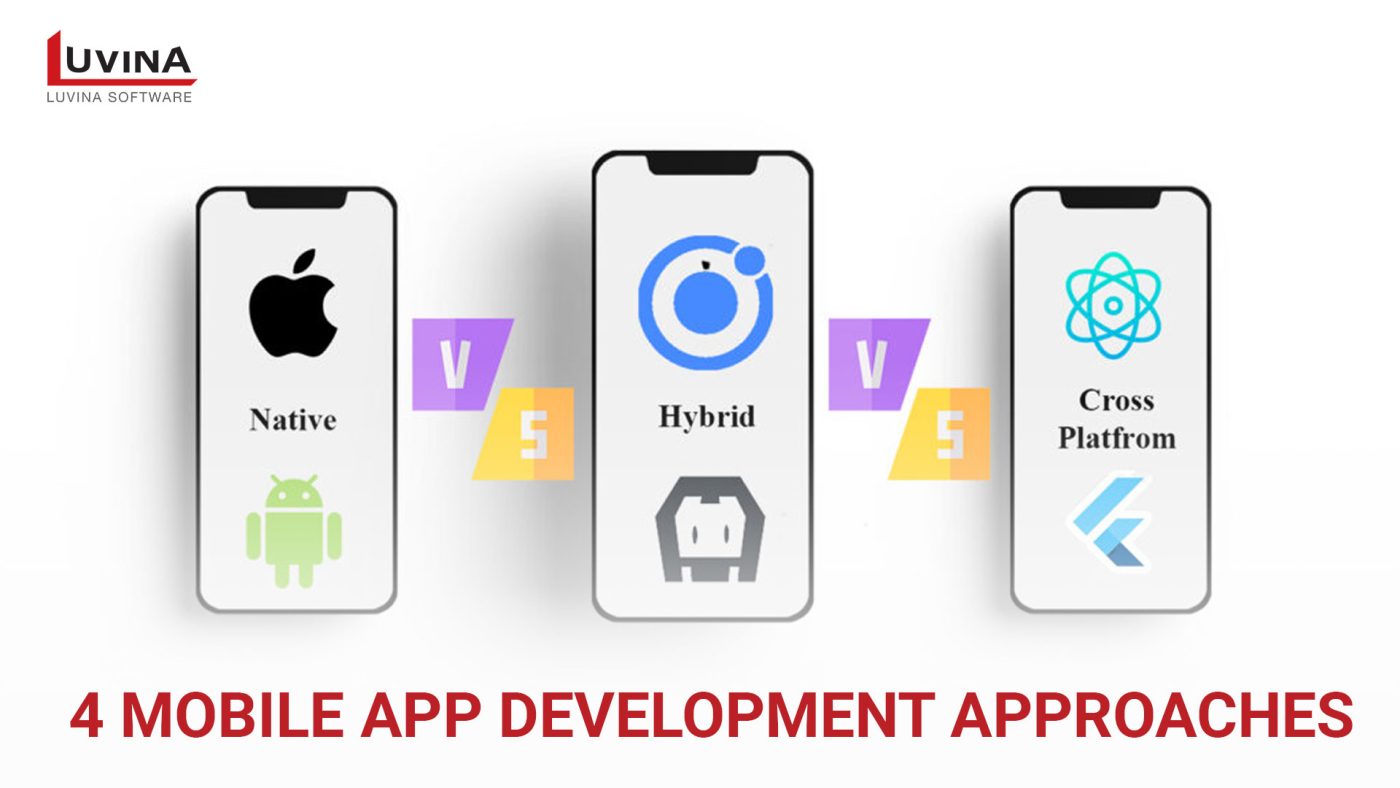In this blog, we compare four frameworks mobile: Native, Hybrid, and Cross-Platform. We examine the advantages of each approach, including performance, user experience, and access to platform-specific features. By the end, readers will gain insights to choose the best framework for mobile app development projects.

We will also address the limitations and drawbacks associated with each approach to provide a comprehensive understanding of their suitability for different project requirements.
From evaluating the trade-off between performance and time-saving in Hybrid and Cross-Platform approaches to exploring the amalgamation of web app features. We will help you gain a clearer understanding of each option and how to choose the most suitable development approach for your project.
Native App Development Framework
1. Definition of native app development
The native app development framework is the building block for crafting mobile apps tailored to specific operating systems. Equipped with tools, libraries, and pre-made elements, this framework streamlines development.
Key traits of the Native app framework encompass tapping into device-specific functions and APIs, yielding top-notch performance and user engagement. Leverage platform-exclusive perks like camera, GPS, and notifications with this framework.
2. Advantages of native development for platform-specific user experiences
Selecting the right framework for mobile applications is vital for mobile app development and creating tailored experiences. Native app framework shines, boosting performance and functionality.
- – Native framework mobile app enables leveraging platform-specific features for seamless integration with the targeted OS.
- – They deliver superior performance by optimizing resource utilization, resulting in smooth navigation and faster loading times.
- – Access to platform-specific libraries and tools allows easy integration of third-party services and efficient debugging.
The choice of the best framework mobile app depends on project requirements, target audience, budget, and developer expertise.
Opting for a framework for mobile applications ensures a seamless user experience, utilizing platform-specific functionalities to the fullest.
3. Limitations and challenges of native app development
Native app development framework has a key limitation: the need for platform-specific knowledge. Each OS (iOS, Android) demands distinct languages and tools, necessitating expertise in multiple areas or reliance on diverse teams.
Moreover, Native frameworks consume time and money. Crafting separate codebases for each platform demands more resources, slowing development. Maintenance and updates become intricate with multiple codebases.

Selecting the best framework for mobile app development poses a challenge, given the array of options. Each has strengths and weaknesses, requiring careful assessment of factors like performance, scalability, support, and compatibility.
Nevertheless, native framework persists due to their power in harnessing device features and offering a seamless user experience. Acknowledging these limitations enables informed decisions, aligning the framework mobile app with project requirements.
Hybrid App Development Framework
1. Understanding the concept and features of hybrid app development
Hybrid apps use web technologies like HTML, CSS, and JavaScript, wrapped in a native container for installation and running on iOS and Android platforms. The hybrid approach offers code reusability, cost-effectiveness, and wider distribution opportunities through app stores, providing a seamless user experience across platforms.
Key features of hybrid app development include:
- – Cross-platform compatibility
- – Code reusability
- – Access to native features
- – Offline capabilities
- – Faster development cycles
2. Benefits of hybrid development for mobile application
Hybrid app development offers several benefits that make it a cost-effective and faster option for app deployment:

- – Single Codebase
- – Faster Development Cycles
- – Code Reusability
- – Cost Efficiency
- – Wider Audience Reach
- – Platform Consistency
- – Offline Functionality
3. Exploring performance considerations and cross-platform compatibility
Native apps offer superior performance by leveraging platform-specific optimizations but require separate codebases for different platforms.
Hybrid apps use web technologies, leading to potential performance challenges, but provide cross-platform compatibility with a single codebase.
Cross-platform framework strikes a balance, offering decent performance and allowing code reuse across platforms.
The best framework for mobile app development depends on project requirements and priorities, as each approach has its strengths and trade-offs. Proper evaluation ensures an optimal development strategy for the desired user experience and market reach.
Cross-Platform App Development Framework
1. Definition and scope of cross-platform app development
Cross-platform app development framework revolutionizes the framework for mobile applications. Cross-platform framework mobile app offers tools and libraries for seamless iOS and Android apps. Developers write code once and deploy it across multiple platforms, streamlining development and reaching a wider audience.
2. Advantages of cross-platform development for code reusability and broader reach
Cross-platform framework mobile apps bring numerous advantages for developers, streamlining mobile app creation across multiple platforms. The solution lies in avoiding separate codebases, saving time, and ensuring code reusability.
A single codebase can deploy on iOS, and Android, eliminating the need for platform-specific development from scratch. This drastically cuts down development time and costs.
Moreover, cross-platform framework mobile apps broaden the audience’s reach for applications. Simultaneous deployment on multiple platforms allows businesses to expand their user base and increase market reach. This not only saves resources but also unlocks new markets, maximizing the app’s potential.
3. Assessing the trade-offs and potential drawbacks of cross-platform development
While cross-platform development brings convenience, assessing trade-offs and drawbacks is crucial. Performance and native experience may not match platform-specific development.
One drawback lies in limited access to platform-specific features. Delayed support for new OS advancements can occur.
Performance issues are another trade-off. Abstraction layers slow down cross-platform apps compared to optimized native ones.
Complex or resource-intensive apps may not suit cross-platform development due to hardware access or functionality limitations.
Key Factors in Choosing the Right Framework
When selecting the right framework for a mobile application, consider these key factors:
- – Project Requirements and Complexity
- – Developer Skill Set and Team Expertise
- – Time-to-Market and Budget Constraint
>> See more: JavaScript – The Best Programming Language for App Development
Future Trends in Mobile App Development Frameworks
Advancements in Hybrid and Cross-Platform Development: Bridging native and web experiences, these frameworks for mobile applications offer better performance and seamless integration. A single codebase reaches a wider audience.
The Impact of AI and Emerging Technologies: AI, machine learning, and augmented reality will revolutionize apps. Personalization, automation, and immersive experiences will reshape user interactions.
In conclusion, Native app development offers top-notch performance but requires separate codebases for different platforms. Hybrid development allows code reuse but may face performance issues. Cross-platform development balances code reusability and native performance. The choice depends on project requirements and budget.
{ Get everything you ever
wanted to know about IT.}








Read More From Us?
Sign up for our newsletter
Read More From Us?
Sign up for our newsletter